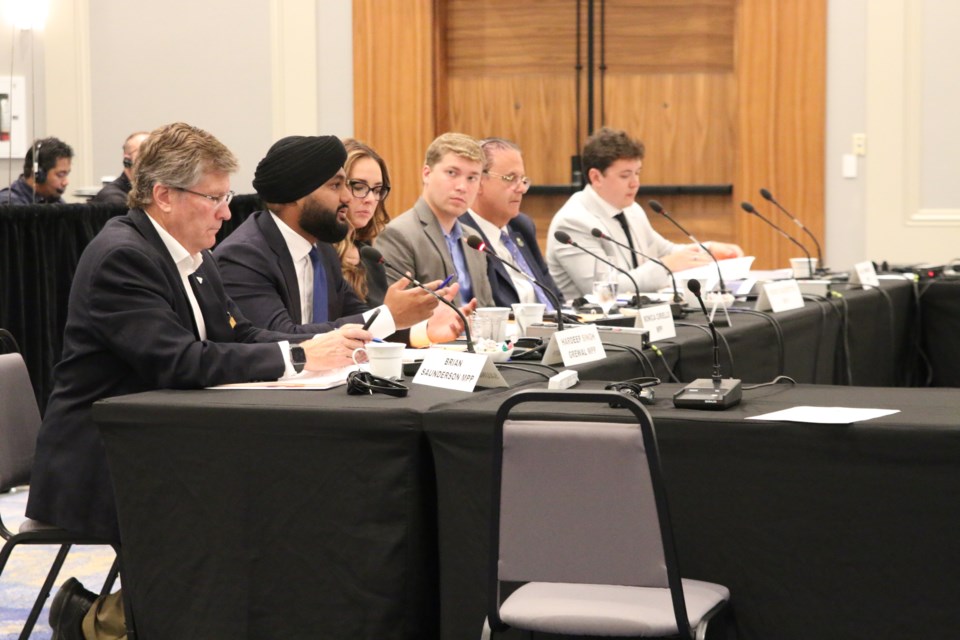THUNDER BAY — The ramifications of a bill that would allow a municipal council member to be removed from council with a unanimous vote of their peers dominated the conversation at a pubic hearing at the Delta Hotels in Thunder Bay on Thursday.
Despite questions about implementation and transparency, there was also a lot of agreement and support for Bill 9, also known as the Municipal Accountability Act, at the final session in a provincial tour.
The bill includes a provision that would allow councillors to be fired and disqualified from running again for four years, if their conduct meets multiple criteria — and if their peers unanimously support their removal.
“That completely politicizes the process once you ask for (a) unanimous vote from councillors. That means you’re really voting one of your peers, possibly one of your friends or one of your political opponents out of office,” Lise Vaugeois, the MPP for Thunder Bay-Superior North, who was present at the hearing.
“So, we think and I think that what we’ve been hearing is that, that political part needs to be removed. Don’t put this in that realm of councillors voting on each other for removal or punishment.”
The legislation, which was first tabled prior to the election and reintroduced this term, proposes numerous changes to the existing Municipal Act.
Aside from allowing council members to be fired, it would standardize local municipal codes of conduct under a provincial framework and mandate that municipal integrity commissioners provide conduct training to councillors and local board members.
“I think that across the province this is welcomed (and) that municipal councils are looking for consistency. They don’t know how to deal with it when there are conflicts within their own councils, so we know this is necessary,” said Vaugeois.
The bill aims to increase accountability for municipal councillors, Vaugeois explained, and unfortunately, as the law stands, councillors have been able to not be accountable and they’ve seen this particularly in regard to sexual harassment.
However, she said there were some significant problems with the bill as it’s written — concerns which she she also heard raised at the hearing on Thursday.
Four people signed up to address the committee, all by Zoom. None of those speakers were from Thunder Bay. Only one was from the region: Kenora City Coun. Lindsay Koch.
Kosh supported the idea of a base code of conduct for council members but suggested there should be an option to make adjustments at the local level. She also suggested that training for council members should be standardized and ongoing, with midway and refresher training.
Koch also suggested that councillors facing criminal charges should not sit in office while the matter goes through the courts.
Vaugeois said she believed the consensus on Thursday was that local integrity commissioners need to be appointed by the Ontario integrity commissioner, not councils, so there’s no internal conflict of interest in local communities.
“Some people think it should go to a judge or a court. The integrity commissioner has that kind of role. It’s not quite a court, but there is authority there and legal knowledge…,” Vaugeois said.
“The code needs to be clear. The consequences need to be clear, whether that’s done by an Ontario superior court judge or something at a lower level, but still has the authority to bring consequences. I think that’s what everybody is asking for.”
In addition, the consequences in the code of conduct also need to be scaled to the issues, she said.
“If it’s a minor issue you don’t want to be saying ‘yes, you’re going to be kicked out.’ You want to have a gradation because otherwise, if it’s all or nothing, then nothing will happen. We know that,” she added.
Vaugeois said there is also concern about genuine political disagreement.
“Sometimes we need to be cautious about the language that we use when we’re having political disagreements, when does it cross the line into being a personal attack or an attack on a group of people, so we need to know where that line is,” Vaugeois said.
They also need to have healthy debate where people disagree, she added.
“I’ve seen that happen on the left, I’ve seen it happen on the right — where people are being shut down for having a different opinion than the dominant opinion of the moment,” Vaugeois said.
“So, it’s important that those conversations are able to take place without getting bogged down in a battle of who is more righteous.”
At the same time, Vaugeois said they have to have very clear guidelines of what constitutes appropriate speech, including how to raise issues, in raising those issues if they are targeting a particular group of people and if so, the appropriate way to express those concerns, respectfully.
The Standing Committee on Heritage, Infrastructure and Cultural Policy has held public hearings in six cities throughout July.
It will return to Queen’s Park for a clause-by-clause reading on Aug. 26.
